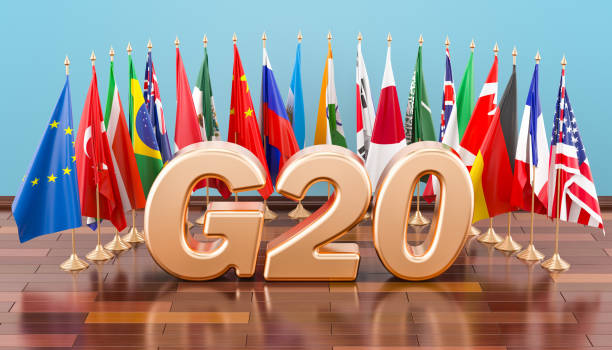
G20 meeting concept, flags of all members G20. 3D rendering
Introduction :
The European Union and 19 of the greatest economies in the world make up the G20, sometimes known as the Group of Twenty. It was founded in 1999 and acts as a hub for policy and economic coordination. Leaders from various countries get together at the G20 summits to discuss issues such as trade, financial stability, and sustainable development. Particularly during times of crisis like the 2008 financial catastrophe, these events are essential for influencing global economic policies. The goal of the G20 is to promote global economic stability and prosperity via discussion, collaboration, and shared policy goals.
G20 member nations can discuss and create policies on agriculture and food security in the G20 Agriculture Working Group (AWG). Since its creation in 2011, the AWG has met regularly to debate a variety of topics, such as:
1. Food cost fluctuation
2. Sustainable farming
3. Nutrition
4. Trade
5. Changing weather
6. spending on agriculture
To address these issues, the AWG has also created a variety of programmes, such as:
The AMIS, or the Agricultural Market Information System AMIS is a global database of agricultural market data that gives decision-makers information on food production, trade, and price trends.
The Food Price Volatility and Agriculture Action Plan: This strategy outlines several steps to address the factors that contribute to the volatility of food prices, including enhancing market transparency and increasing investment in agriculture.
The Global Agriculture and Food Security Programme (GAFSP) is a financing instrument that offers grants and loans to poor nations to ensure secure and sustainable food supply.
These projects had created the potential to significantly improve food security for everyone. G20: Building a Sustainable and Resilient Future for All
The G20 presidency by India provided a chance to highlight the nation’s agricultural know how and to advance sustainable agriculture and food security. India hosted the 2023 G20 New Delhi summit from September 9 to 10, 2023. “Vasudhaiva Kutumbakam” (One Earth, One Family, and One Future) serves as the summit’s theme.
Here are a few of the summit’s particular goals for September 2023:
1. Attain net-zero emissions by 2050 and hasten the shift to a sustainable energy economy.
2. To encourage development that is sustainable and make sure no one is left behind. 3. To boost the global economy’s strength and make it more shock-resistant. 4. To enhance nutrition and food security.
5. To advance universal healthcare and enhance the state of the world’s health.
The G20 summit in September 2023 was significant chance for the top economies in the world to get together and addressed the most urgent issues confronting the globe. The ability of all nations to cooperate and put the interests of the whole ahead of their own particular interests determine the summit’s success.
During presidency, India has named agriculture as one of its top priorities. To encourage sustainable agriculture and food security, the nation has started a number of initiatives, such as:
1. The International Research Initiative on Millets and Other Ancient Grains (MAHARISHI): This programme aims to promote the growing and eating of millets and other ancient grains, which are nutrient-dense and climate-resilient crops.
2. In order to promote sustainable agriculture and food security, the One Earth One Family One Future (OOFOF) programme takes a comprehensive strategy that takes into account the requirements of all stakeholders, including farmers, consumers, and the environment.
Here are some further G20 summit-related news items:
1. The G20 overwhelmingly voted to add the African Union as a permanent member. 2. Due to the ongoing conflict in Ukraine, Russian President Vladimir Putin was not extended an invitation to the meeting.
3. On the fringes of the summit, a private meeting between the United States and China took place.
4. The G20 summit is a significant international gathering that gathers the heads of the world’s most developed nations together to debate and address global concerns. The summit’s results might have a big impact on the world economy and billions of people’s lives.


